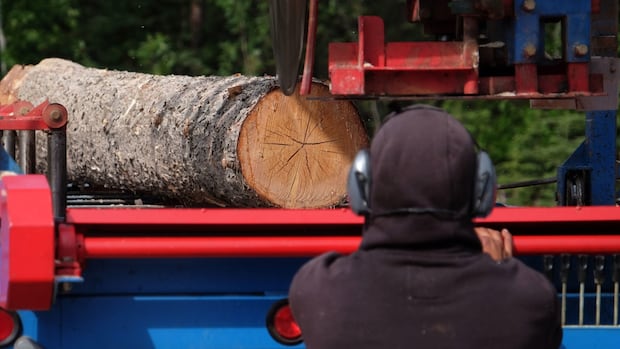The U.S. is set to more than double the duty it charges on softwood lumber imports from Canada, with the planned new rate set at 34.45 per cent, up from the previous 14.54 per cent.
While the preliminary determination was not immediately posted to the U.S. Federal Register, it was confirmed in statements from the B.C. premier’s office and the U.S. Lumber Coalition, a trade industry body.
New softwood lumber duties were long-feared amid the growing trade war between Canada and the U.S., and would be the latest blow to B.C.’s beleaguered forestry industry, which has seen thousands of workers laid off over the last few years.
B.C. Premier David Eby condemned the planned duty hike as an “attack on forest workers and British Columbians” in a statement on Saturday.
While Canada may have been spared additional tariffs from the U.S. on Wednesday, anxiety around levies on B.C.’s softwood lumber industry remains high. As Katie DeRosa reports, Premier David Eby hopes to get federal focus on the issue as the forestry sector meets to discuss reducing its reliance on the U.S.
“In Canada, the continued unjustified softwood lumber duties, combined with additional U.S. tariffs and other trade actions, have united Canadians,” he wrote.
“We have friends and family in the United States who need Canadian lumber to build or rebuild their homes, and both Canadians and Americans need an end to this trade dispute.”
Under the U.S. Tariff Act, the Department of Commerce determines whether goods are being sold at less than fair value or if they’re benefiting from subsidies provided by foreign governments.
In Canada, lumber-producing provinces set so-called stumpage fees for timber harvested from Crown land, a system that U.S. producers — forced to pay market rates — consider an unfair subsidy.

Indeed, the U.S. Lumber Coalition — which represents softwood lumber producers in that country — welcomed the planned spike in duties in a statement on Friday.
“These unfair trade practices are designed by Canada to maintain an artificially inflated U.S. market share for Canadian products and force U.S. companies to curtail production, thereby killing U.S. jobs,” said Andrew Miller, the chairman of the coalition, in the statement.
Eby to meet with PM
CBC News has reached out to Global Affairs Canada to find out if the federal government plans to take countermeasures against the planned hike in duties.
In August 2024, when the duties were hiked from 8.05 per cent to 14.54 per cent, the federal government had indicated it would fight the tariffs at the U.S. Court of International Trade and at the World Trade Organization.
B.C.’s forest industry is already in serious trouble, and U.S. President Donald Trump’s tariff war is pushing it closer to the brink of collapse. CBC’s Lyndsay Duncombe breaks down what’s at stake for lumber producers and how they’re looking to adapt.
Eby said the B.C. government would work with the forest sector and the federal government to fight the duties “through all avenues available to us.”
“I am meeting with the Prime Minister on Monday … and I plan on raising this issue with him directly,” the premier said.
“B.C. workers and their families depend on the jobs that these tariffs are targeting, and we hope to see the same Team Canada approach to protecting them, just like with the automotive and steel industry jobs in Ontario and Quebec.”
The United States has long been the single largest market for B.C. lumber exports, representing over half the market for the approximately $10-billion industry.
But amid a series of challenges for the province’s forestry industry — including a mountain pine beetle infestation that killed hundreds of thousands of trees — mills have been closing around the province in recent years, and major forestry companies are opening up new mills in the United States.
In 2023, numbers from Statistics Canada showed B.C. had lost more than 40,000 forest-sector jobs since the early 1990s.


